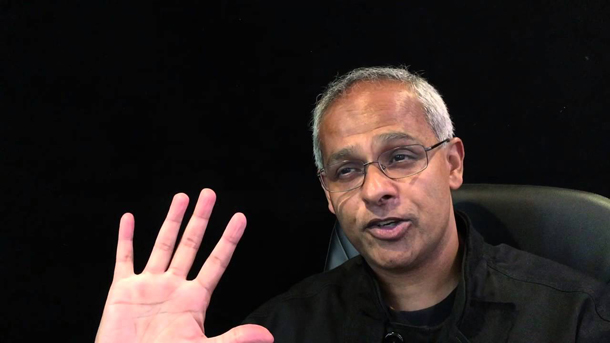[Editor’s note: What kind of future will we inhabit? Many thinkers say we're moving toward automated job scarcity, digital sharing gig economies, yawning wealth imbalances, post-carbon energy, explosive innovation, new values about consumption and contentment, capitalism 2.0… anything but business as usual. Over the next few months, this Tyee occasional series will talk to experts with differing visions of a transforming global economy.]
Satyajit Das believes the global go-go growth economy is quickly ending and a tough transition lies ahead. What to expect? The title of his new book succinctly predicts: The Age of Stagnation: Why Perpetual Growth is Unattainable and the Global Economy is in Peril.
An Australian born in Calcutta, Das draws on a range of experience -- banker, corporate treasurer, industry consultant, academic, author -- in making his prognostication. His views on what actually causes an economy to grow stand in contrast to how governments model and forecast economic trends.
Das argues factors that enabled decades of gradually increasing prosperity throughout the post-Second World War era will be overwhelmed by a range of financial, economic, demographic, resource, and environmental challenges in the next few decades.
The Tyee asked Das to break down those critical forces.
The Tyee: What is your future vision of the global economy over the next 20 years? What are the next few decades going to look like?
Satyajit Das: I think the last 50 to 60 years were quite odd in terms of the longer run economic history of the world. Now, we face a series of challenges. Some are financial and some are non-financial. But, they are all linked. The first challenges I would list are financial and economic, built around excessive debt. The sum of global debt is about three times GDP. If we had interest rates of three per cent on average, the global economy would need to grow annually, over the long run, by roughly nine per cent just to service it.
Policymakers and most people have decided it's just too difficult to deal with. For now, they ignore it. But these things can't be ignored forever. Not only did we borrow, but we also promised ourselves government services, like elder care and health care, which haven't been fully paid for. These will have to be paid over the next 20 to 30 years.
In the United States, the total government debt is $18 to $19 trillion. Add all of these unfinanced obligations and that sum would go to about $40 trillion. A second set of challenges stem from resource constraints.
If you look at water, consumption is rising at a rate, which is roughly a new Rhine River every year.
Food production has to increase by roughly 50 per cent by mid-century to feed a larger population but also to meet demand for different types of food. As people get richer, they want more protein. This requires larger scale production facilities. The amount of arable land on the planet, about 3.4 billion acres, has not changed very significantly for decades. It is shrinking because of climate change and other problems.
The planet is now full of fact-resistant humans and we don't want to even acknowledge climate change. We're experiencing extreme weather conditions which impact on the costs of world operations, in terms of insurance, food production, and many other things.
And there are a whole series of other problems for economic growth, like the demographics of aging. Also, improvements in economic productivity and rates of innovation have generally flattened off.
We also face geopolitical uncertainties, some of which are going to become more heightened with fights over food rights, water security, and energy security.
But, the thing that dooms us to an age of stagnation is that we do not want to confront any of this. We currently have a model of dealing with these issues, which is counterproductive. We can loosely call it the extend-and-pretend model. We tend to defer the problems, pushing them into the future, often in financial terms.
The whole model of quantitative easing, low interest rates and government spending, does not actually solve these underlying problems. For example, climate change summits tend to defer the problem rather than confronting it. All we're doing is piling these problems up. And as we do this, the problems get bigger. Eventually, all of these factors combine to effectively make it more difficult to generate periods of economic growth across the planet.
To be honest, economic growth is not really essential. Unless we want constantly improving living standards. And also, if we want to deal with global financial problems.
You are saying we've tended to defer these issues rather than confronting them head on, yet, when I go to conferences, I hear a lot of speakers say growth is going to accelerate in the future as the global human population is heads to nine billion. This is the narrative you hear at the World Economic Forum in Davos. You are saying that we're heading toward an entirely different world from this one?
I would call this the Davos-man narrative. The Davos-man narrative, in a sort of weird way, believes that growth is a perpetual thing without really examining what drives it. One factor that drives growth is population. People seem to have lost sight that while global population heads toward nine billion, in the 20th century the population of the Earth doubled twice. Despite what economists and business people say, most of [economic] growth actually came from more people. People need shelter, they need food, they need water, they need education, they get married and have children of their own. All of that drives growth. In the 21st century, the world's population will not double even once.
There are further implications of this nine billion we are talking about. Firstly, that number has actually been downgraded from around 10 billion by the United Nations Development authorities. Basically, people are not reproducing at the same rate. Fertility rates have dropped. We can also ask: would this nine billion even be environmentally sustainable? Or, where is this population growth going to come from? Most of it is projected to come from poorer nations in Sub-Saharan Africa and parts of South Asia, and partially in Latin America. These regions contribute little to large-scale economic activity and global growth. To a large extent, their economies need transfers from richer countries.
I've been around businesses most of my life. Whenever I hear talk of countries like China, I'm always reminded of listening to a businessman in a consumer products firm. He was espousing his company's strategy for China. I asked him, 'Why do you think China will be such a successful market for your products?' He said: 'There are a billion Chinese. I sell deodorant. There are now two billion extra armpits.'
I thought that was a rather simplistic view of why he was going to succeed. First, the elimination of armpit odour may not be a top priority among poorer people. Would they actually be able to afford his product? Or, culturally concerned about it in the first place? All of these things seemed to be irrelevant to him.
I think Davos-man spends a lot of time with these very simplistic formulas. They appear to be very persuasive on the surface. In reality they are not.
This interview was lightly edited for readability.
Listen to more of Satyajit Das: To hear an extended interview with Satyajit Das on The Age of Stagnation, listen to this recent episode of The Extraenvironmentalist podcast.
About Satyajit Das: From 1977 to 1987, Das worked in banking with the Commonwealth Bank, CitiGroup and Merrill Lynch. From 1988 to 1994, he was Treasurer of the TNT Transport Group. His books include Traders, Guns & Money (2010), Extreme Money (2011) and reference books on derivatives and risk-management. He lives in Sydney, Australia. His new book, The Age of Stagnation, was originally released in Australia as A Banquet of Consequences. For the North American release, the name was changed to avoid being confused as a cookbook. ![]()


















Tyee Commenting Guidelines
Comments that violate guidelines risk being deleted, and violations may result in a temporary or permanent user ban. Maintain the spirit of good conversation to stay in the discussion.
*Please note The Tyee is not a forum for spreading misinformation about COVID-19, denying its existence or minimizing its risk to public health.
Do:
Do not: